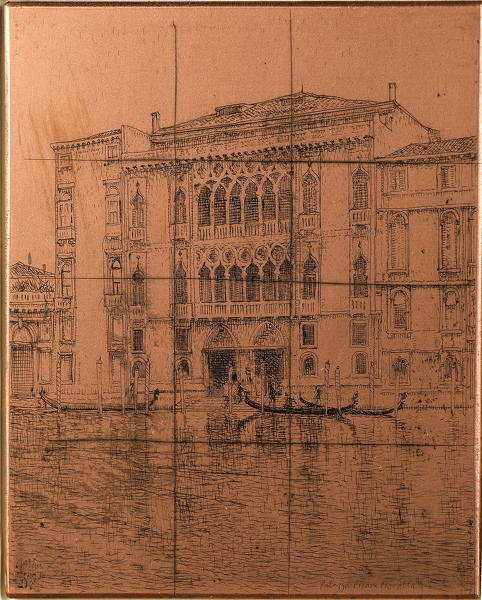
£940
Venice, Palazzo Pisani Moretta
Framed (ref: 3958)
Original Copper Plate, cancelled by the artist, 3 3/4 x 3 1/8 in. (9.5 x 8 cm.)
(7 1/4 x 6 3/4 in. (18.5 x 17 cm.) framed)
Tags: Robert Austin plate architecture maritime Metropolitan

Original Copper Plate, cancelled by the artist, 3 3/4 x 3 1/8 in. (9.5 x 8 cm.)
(7 1/4 x 6 3/4 in. (18.5 x 17 cm.) framed)
Tags: Robert Austin plate architecture maritime Metropolitan
Provenance: The Artists Family
Literature: Campbell Dodgson, Robert Austin, Twenty-One Gallery, 1930;
Gordon
Cooke, Drawings and Prints by Robert Austin, London, The Fine Art
Society, 2001
Robert Austin's original etching plates were rediscovered in 2007. They
represents all aspects of the artists
oeuvre, from his first engraving (The Bridge, 1913 ) to his his last
(Frost in May 1971). Although, as was common practice amongst print
makers, Austin cancelled his plates after their edition run, the manner
in which he did this is remarkable. Far from defacing the compositions
by scratching lines across the centre, or drilling holes in the plates,
Austin drew precise lines of different proportions, dissecting each
composition, responding individually to each image. As such the
geometry of each composition appears heightened, and the plates take on
a abstract beauty of their own.
It is generally acknowledged that Austin was one of the greatest
exponents of line engraving of the Twentieth century. Campbell Dodgson,
keeper of Prints and Drawings at the British Museum, who compiled the
standard reference work on Austins' work, compared his work to that of
Durer noting that Austin had 'more than a touch of that master in him'
(Robert Austin, Twenty-One, 1930 Gallery).
Austin's period of greatest acclaim was during the etching boom of the
1920s (which ended abruptly with the Wall Street Crash).
Later works however, (for instance Girl by a gate,1930 and Empty
Church, Concarneau, 1949,) demonstrate that Austin was still at the
height of his powers later on in life.